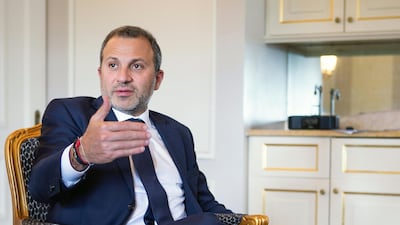As Lebanon's foreign minister, Gebran Bassil has in recent months taken steps to quicken the return of Syrian civilians who in the past seven years crossed the border to flee civil war.
The issue simmered but did not boil over during political campaigning for Lebanon's general election in May but it is now gaining traction in Beirut, even though a government has not been formed.
Speaking to The National, Mr Bassil hesitates to call such Syrians refugees, instead describing them as "migrants" and "displaced".
"Lebanon does not accept Syrians to be refugees, not one of them," he said on the margins of the United Nations General Assembly in New York.
His argument is that Lebanon is not a signatory to the Convention Relating To The Status Of Refugees, a UN multilateral treaty agreed in 1951, and thus is not required to grant refugee status.
He is also sensitive to the need and some public desire for repatriation of the more than one million Syrians in Lebanon because of the war.
"It's stipulated in our constitution, it’s related to the existence of the country that’s based on a certain equilibrium and balance, you cannot all of a sudden introduce 50 per cent of its population to the country."
The UN agency for refugees puts the figure at about a million but Lebanon's government says it is more like 1.5 million, around a quarter of Lebanon's population.
Mr Bassil, who met his Russian counterpart Sergei Lavrov in Moscow recently to address the need for Syrian repatriation, calls the issue "an existential threat" to a country whose political system is rooted in balancing sectarian representations and interests.
"We hope to use our presence here to drive countries towards our policy towards the necessity of return," he said.
Since 2017, Lebanon has repatriated a few thousand Syrians, but international organisations such as the UNHCR are sounding the alarm over forced returns to unsafe areas, with its officials saying they do not believe the right conditions are in place to do so.
Mr Bassil does not agree.
"They should feel at comfort to go back… and (we) have to stop encouraging them from staying in Lebanon," he said.
"The return of refugees has to happen gradually, we are talking about different categories of refugees, some are economic migrants."
While the Lebanese Foreign Minister said Syrian President Bashar Al Assad "has been approving lists" prepared by Lebanon's powerful General Security section for repatriation the process is slow.
Last month Lebanon's army escorted 250 people out of the border town of Arsal, out of 3,000 from the town who registered to return. The numbers dwindled because men and youths of fighting age were stripped out and families did not want to be split up.
_______________
Read more:
Sheikh Abdullah leads UAE participation at UN General Assembly
Anwar Gargash: Arabs must be at table in any new Iran negotiations
_______________
The war in Syria is also being felt in Lebanon's domestic politics.
Asked about the stalemate in government formation in Lebanon, Mr Bassil blamed regional influence. “In the back mind of some players, they are betting on regional politics but we think it will pass.” He acknowledged Hezbollah’s open breach of the policy of dissociation but accused others of doing it "more tacitly", without being explicit or naming anyone.
On the US sanctions on Iran and whether Lebanon would implement the restrictions, Mr Bassil did not give a direct answer. “Lebanon is always abiding by UN resolutions, and doing what it needs to preserve its interests, its friendships, while maintaining its stability."

